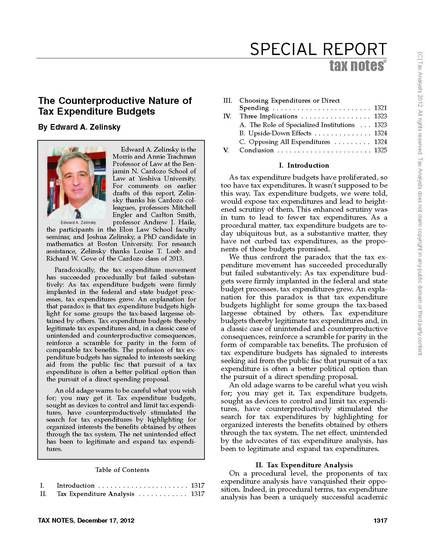
Article
The Counterproductive Nature of Tax Expenditure Budgets
Tax Notes
(2012)
Abstract
Paradoxically, the tax expenditure movement has succeeded procedurally but failed substantively: As tax expenditure budgets were firmly implanted in the federal and state budget processes, tax expenditures burgeoned. An explanation for this paradox is that tax expenditure budgets highlight for some groups the tax-based largesse obtained by others. Tax expenditure budgets thereby legitimate tax expenditures and, in a classic case of unintended and counterproductive consequences, reinforce a scramble for parity in the form of comparable tax benefits. The profusion of tax expenditure budgets has signaled to interests seeking succor from the public fisc that pursuit of a tax expenditure is often a better political option than the pursuit of a direct spending proposal.
An old adage warns to be careful what you wish for; you may get it. Tax expenditure budgets, sought as devices to control and limit tax expenditures, have counterproductively stimulated the search for tax expenditures by highlighting for organized interests the benefits obtained by others through the tax system. The net effect, unintended by the advocates of tax expenditure analysis, has been to legitimate and expand tax expenditures.
Keywords
- tax expenditures,
- tax expenditure budget,
- direct spending,
- entitlements,
- capture,
- salience,
- tax salience,
- upside down effect
Disciplines
Publication Date
December 17, 2012
Citation Information
Edward A. Zelinsky. "The Counterproductive Nature of Tax Expenditure Budgets" Tax Notes Vol. 137 (2012) p. 1317 Available at: http://works.bepress.com/edward-zelinsky/242/
